Curated OER
Moles, Stoichiometry, and Concentration
In this stoichiometry worksheet, learners practice calculating moles, molar mass, and percentage composition of given compounds. This worksheet has 55 problems to solve.
Curated OER
Chemistry Word Search
In this chemistry worksheet, students locate and identify various vocabulary terms related to chemistry. There are nine words/phrases located in the puzzle to find.
Curated OER
Lewis Structures, VSEPR, Polarity, IM Forces
In this compounds worksheet, students draw the Lewis structures, indicating the molecular polarity and the major intermolecular force in each compound. This worksheet has 10 problems to solve.
Curated OER
Stoichiometry
In this stoichiometry worksheet, students review mole conversions, percent composition, empirical formulas and molecular formulas. This worksheet has 6 problems to solve.
Curated OER
Chemistry 1A Review
In this Chemistry 1A worksheet, students review, molecular weight, solubility, endothermic reactions, and number of protons, neutrons, and electrons for elements. Students review Lewis Structures and how to predict the amount of product...
Curated OER
Empirical and Molecular Formula
In this formulas activity, students review how to write compounds in their empirical formula and molecular formula. Then students complete 4 problems.
Curated OER
Science: Pigments and Photosynthesis
Students explore the process of photosynthesis by identifying chloroplasts and chlorophyll pigments. In a demonstration, they observe a demonstration connecting pigments with sunlight conversion into energy. Using paper chromatography,...
Curated OER
Balancing Symbolic Equations
In this chemistry instructional activity, students balance the listed equations by changing the coefficients. They identify and explain why iron bromide can react with water to produce iron oxide and hydrogen bromide.
Curated OER
Using Ion Exchange Chromatography to Separate Proteins
Students explore protein purification by separating a positively charged molecule, lysozyme, from a negatively charged molecule, albumin, at neutral pH using ion exchange chromatography.
Curated OER
What is Temperature?
Students study the effects of temperature and air expansion. In this temperature lesson, students discuss temperature and participate in a role play of low energy and high energy molecules. Students then discuss their activity and...
Curated OER
SEPARATION OF A STARCH-GLUCOSE MIXTURE USING GEL FILTRATION
Students make a starch-glucose solution and pour it through gel in order to separate the starch from the glucose. They examine how starch is a larger molecule than glucose and test for the presence of these substances using other...
Curated OER
Separating a Starch-Glucose Mixture Using Gel Filtration
Students experiment using the basic principles of gel filtration. They use the gel filtration technique for testing for the presence of specific substances. Students discover that starch is a larger molecule than glucose.
Curated OER
Ozone Tag
Young scholars explain the role of stratospheric ozone and predict at least three ways in which depleted ozone would change her/his lifestyle. They then
describe the process by which chlorine or bromine compounds can break down ozone...
Curated OER
Basic Chemistry Review
Students experiment to show their knowledge of molecules and atomic structures. In this chemistry review lesson students participate in an activity and then fill out a worksheet.
Curated OER
Pauli's Magical Water
Students predict the shape of molecules using VSEPR theory. In this chemistry lesson plan, students differentiate a polar and nonpolar molecule. They discuss why water's polarity is very important.
Curated OER
Take a Dip: Sticky Water
Students complete lab activities to investigate the "sticky" properties of water, such as surface tension and capillary action, due to the polarity of the molecules.
Curated OER
Learning Lesson: How it is Currently Done
Students create their own ocean currents by using everyday items. They examine the constant pushing of molecules that makes us feel wind. They discuss how the water moves in the Southern Hemisphere.
Curated OER
Clean Air
Students observe gas molecules in the atmosphere absorbing the light that goes through them.
Curated OER
Passive Causal Agents and the Omnidirectional Nature of Air Pressure
Students study passive causal agents, such as air pressure, in a system. They conceptualize air pressure as passive and omnidirectional, with molecules that make up the air bouncing off surfaces with which they have contact in all...
Curated OER
Kids for Conservation Lesson 1
Third graders observe various demonstrations dealing with the water on our earth, such as a comparison of the amount of salt water and fresh water on earth, then participate in a role playing activity in which they become a molecule of...
Curated OER
Colored H2 Balloon Explosions
Young scholars perform an experiment in which they put different types of salts in a balloon, fill it with hydrogen gas, and ignite it. The electrons in the salt molecules are excited by the heat and release energy in the form of light....
Curated OER
Cloning of Plasmid and Spinach DNA
Students ligate fragments of genomic DNA from spinach into a vector plasmid. They perform a restriction enzyme digestion. Student use a ligated DNA molecule to transform E. coli cells. Students analyze their procedures and outcome of...
Curated OER
Exploring Magnetism
Twelfth graders experiment with magnets in order to visualize that magnets have a north and south pole, some materials can be magnetized, and magnetization occurs because of the magnetic moments of individual molecules in matter.
Curated OER
Einstein's BIg Idea
High schoolers discuss what the m in E=mc2 represent. They relate that mass in a chemical reaction is always conserved. Students convey that atoms rearrange themselves in chemical reactions to form different molecules and compounds.
Other popular searches
- Atoms and Molecules
- Gumdrop Atoms and Molecules
- Atoms & Molecules
- Compounds and Molecules
- Water Molecules
- Organic Molecules
- Atoms Molecules
- Building Molecules
- Molecules of Life
- Gas Molecules
- Matter and Molecules
- Biological Molecules

























